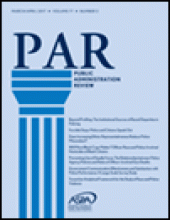
Abstract
Despite the importance of peers in forming role expectations, fostering group identity, and facilitating job learning, limited theory and empirical evidence exist on the antecedents of street-level peer relationships. To address this gap, the authors draw on social capital and social exchange theories to develop hypotheses about the micro-social foundations of street-level bureaucrats’ peer selection. The hypotheses are tested using a rich data set from an intraorganizational network of teachers in a large urban school implementing a reform that strongly promoted frontline innovation. Both structural and instrumental considerations, such as seeking peers possessing characteristics and resources valued by the reform, figure prominently in the work relations of street-level bureaucrats. These results imply that the introduction of improvement initiatives requiring frontline participation, in addition to altering work practices, may also alter social networks within the frontline of an organization in a manner that favors some frontline workers over others.
